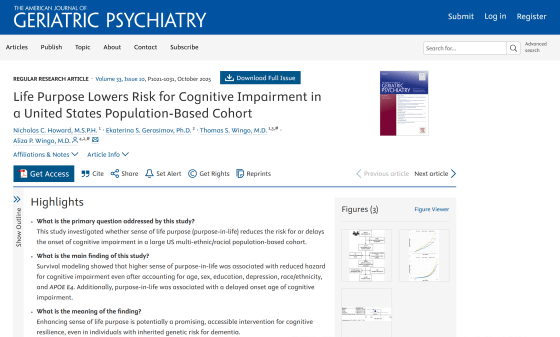It turns out that having a purpose in life may help prevent dementia

Dementia, which causes memory and judgment problems, is a major threat to older adults, affecting patients and their families worldwide. A new study that followed more than 10,000 people living in the United States for up to 15 years suggests that having a purpose in life may help prevent dementia.
Life Purpose Lowers Risk for Cognitive Impairment in a United States Population-Based Cohort - The American Journal of Geriatric Psychiatry

Having a sense of purpose may protect against dementia
https://health.ucdavis.edu/news/headlines/having-a-sense-of-purpose-may-protect-against-dementia/2025/08
Your Life's Purpose Could Be Keeping Dementia at Bay, Study Finds : ScienceAlert
https://www.sciencealert.com/your-lifes-purpose-could-be-keeping-dementia-at-bay-study-finds
A research team at the University of California, Davis, used data from the Health and Retirement Study, a longitudinal study of middle-aged and older Americans, to follow 13,765 participants who underwent objective assessments of cognitive function over a period of up to 15 years.
The subjects completed the seven-itemRyff Measures of Psychological Well-being questionnaire, which included items like 'I am a person who actively carries out the plans I make for myself' and 'I have a clear sense of direction and purpose in life.' Participants completed these questions on a six-item scale. Based on their responses, the researchers measured participants' sense of purpose in life.

The analysis revealed that 1,820 people, or about 13% of the subjects, developed dementia during the follow-up period, but subjects with a 'strong sense of purpose' in life had a 28% lower risk of developing dementia, including mild cognitive impairment. Furthermore, even when symptoms of dementia did appear, these groups developed them at a later age.
The protective effect of having a sense of purpose in life was observed across a wide range of racial and ethnic groups, and remained significant even after controlling for related factors such as education level and depression, as well as
'Our findings suggest that having a sense of purpose helps maintain the brain's resilience to aging,' said study co-author Aliza Wingo, professor in the Department of Psychiatry and Behavioral Sciences at the University of California, Davis. 'Even in people with a genetic risk for Alzheimer's disease, having a sense of purpose was associated with a delayed onset of dementia and a reduced risk of developing it.'

'While drugs like lecanemab and donanemab slightly slow the onset of cognitive impairment in Alzheimer's disease, they come with risks and costs,' said lead author Nicholas Howard, a public health researcher at the University of California, Davis. 'Purpose in life is free, safe, and available to everyone. It's something people build through relationships, goals, and meaningful activities.'
'What's exciting about this research is that it shows that people may be able to improve their health by simply thinking about it,' said study co-author Thomas Wingo, professor in the School of Health Sciences at the University of California, Davis. 'We can develop our own purpose in life. It's never too early or too late to start thinking about what gives meaning to your life.'
Related Posts:
in Science, Posted by log1h_ik







